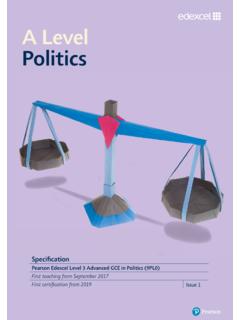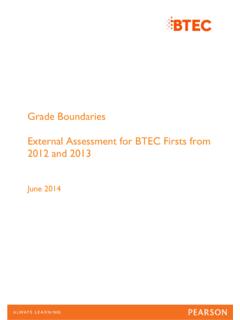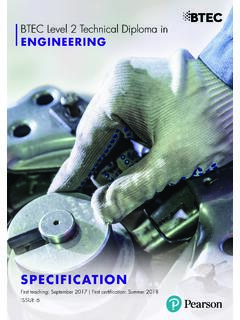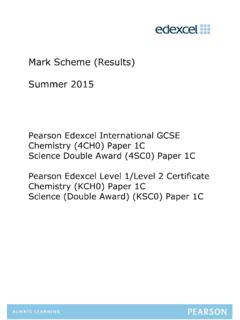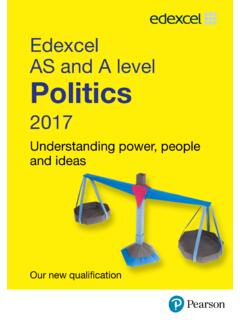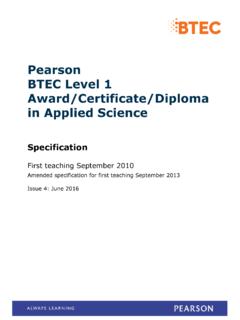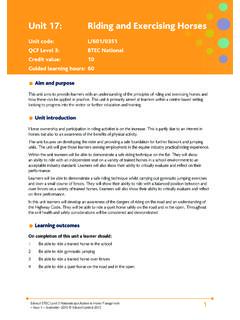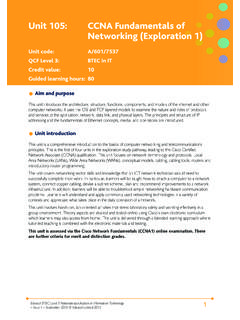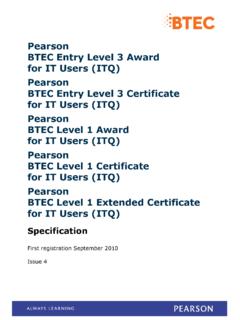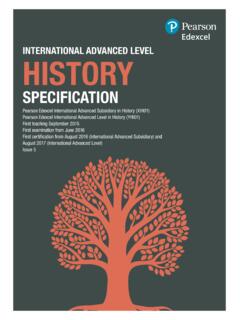Transcription of GCSE (9-1) Astronomy - Edexcel
1 This draft qualification has not yet been accredited by Ofqual. It is published to enable teachers to have early sight of our proposed approach to Pearson Edexcel Level 1/Level 2 gcse (9 - 1) in music (1MU0). Further changes may be required and no assurance can be given at this time that the proposed qualification will be made available in its current form, or that it will be accredited in time for first teaching in September 2016 and first award in Edexcel Level 1/Level 2 gcse (9 - 1) in Astronomy (1AS0)First teaching from September 2017 First certification from June 2019 gcse (9-1)AstronomyIssue 2 Contents 1 Introduction 2 Why choose the Edexcel gcse in Astronomy ? 2 Supporting you in planning and implementing this qualification 3 Qualification at a glance 4 2 Subject content and assessment information 6 Paper 1: Naked -eye Astronomy 9 Paper 2: Telescopic Astronomy 23 Observational skills 42 Assessment Objectives 47 3 Administration and general information 48 Entries 48 Access arrangements, reasonable adjustments, special consideration and malpractice 48 Student recruitment and progression 51 Appendix 1: Mathematical skills 55 Appendix 2: Formulae and data sheet 56 Appendix 3: Calculators 58 Appendix 4: Taxonomy 59 Appendix 5: Observation Statement 61 Appendix 6: The context for the development of this qualification 62 Appendix 7: Transferable skills 64 Appendix 8.
2 Codes 65 Pearson Edexcel Level 1/Level 2 gcse (9 1) in Astronomy Specification Issue 2 May 2021 Pearson Education Limited 2016 2 1 Introduction Why choose the Edexcel gcse in Astronomy ? Supporting success in science Most people are fascinated by the night sky and are interested in stories about our continuing exploration of our Solar System and Universe. This course has been developed to build on that interest and to give an introduction to the subject of Astronomy . The course will enable students to understand our position in the Universe, the movements of planets and stars, the cycles in the night and daytime sky, and the way in which we use technology to observe and interact with space. Students will follow an incredible story of how scientists, from ancient civilisations to the modern day, have used their imagination and carefully recorded visual measurement to explore the Universe in which we live.
3 As with our gcse (9 1) Science specifications, our Astronomy specification is straightforward to deliver. And we ve selected a range of observational activities to suit schools that are well equipped with telescopes and those that are more modestly resourced. Of course, when it comes to our assessments, they are shaped to encourage all students to best show what they know and can do. Every student is different. But we hope that, across the astronomical content and the suggested observational activities, you can build an inclusive course, to allow your students to enjoy their first steps in Astronomy and maybe turn those steps into giant ! Pearson Edexcel Level 1/Level 2 gcse (9 1) in Astronomy Specification Issue 2 May 2021 Pearson Education Limited 2016 3 Supporting you in planning and implementing this qualification Planning Our Getting Started guide gives you an overview of the new gcse qualification to help you to get to grips with the changes to content and assessment and to help you understand what these changes mean for you and your students.
4 Our mapping documents highlight key differences between the new and 2009 qualifications. Teaching and learning There will also be some free teaching and learning support to help you deliver the new qualifications, including: a course planner and schemes of work that you can adapt to suit your department support in delivering a range of observational activities which form part of the specification content. Preparing for exams We will also provide a range of resources to help you prepare your students for the assessments, including: access to past papers to allow you to develop homework and test resources, marked exemplars of student work with examiner commentaries. ResultsPlus ResultsPlus provides the most detailed analysis available of your students exam performance. It can help you identify the topics and skills where further learning would benefit your students.
5 Get help and support Our subject advisor service, led by Stephen Nugus and Julius Edwards will ensure you receive help and guidance from us and that you can share ideas and information with other teachers. Learn more at Pearson Edexcel Level 1/Level 2 gcse (9 1) in Astronomy Specification Issue 2 May 2021 Pearson Education Limited 2016 4 Qualification at a glance Content and assessment overview The Pearson Edexcel Level 1/Level 2 gcse (9 1) in Astronomy consists of two externally-examined papers. Students must complete all assessment in May/June in any single year. Paper 1: Naked-eye Astronomy (*Paper code: 1AS0/01) Written examination: 1 hour and 45 minutes 50% of the qualification 100 marks Content overview Topic 1 Planet Earth Topic 2 The lunar disc Topic 3 The Earth-Moon-Sun system Topic 4 Time and the Earth-Moon-Sun cycles Topic 5 Solar System observation Topic 6 Celestial observation Topic 7 Early models of the Solar System Topic 8 Planetary motion and gravity Assessment overview A mixture of different question styles, including multiple-choice questions, short-answer questions, calculations, graphical and extended-open-response questions.
6 *See Appendix 8: Codes for a description of this code and all other codes relevant to this qualification. Pearson Edexcel Level 1/Level 2 gcse (9 1) in Astronomy Specification Issue 2 May 2021 Pearson Education Limited 2016 5 Paper 2: Telescopic Astronomy (Paper code: 1AS0/02) Written examination: 1 hour and 45 minutes 50% of the qualification 100 marks Content overview Topic 9 Exploring the Moon Topic 10 Solar Astronomy Topic 11 Exploring the Solar System Topic 12 Formation of planetary systems Topic 13 Exploring starlight Topic 14 Stellar evolution Topic 15 Our place in the Galaxy Topic 16 Cosmology Assessment overview A mixture of different question styles, including multiple-choice questions, short-answer questions, calculations, graphical and extended- open-response questions. Pearson Edexcel Level 1/Level 2 gcse (9 1) in Astronomy Specification Issue 2 May 2021 Pearson Education Limited 2016 6 2 Subject content and assessment information The subject content sets out the knowledge, understanding and skills relevant to this qualification.
7 Together with the assessment information, it provides the framework within which centres create their programmes of study. Qualification aims and objectives The aims and objectives of this qualification are to enable students to: understand the structures of the Earth, Moon and Sun; and how their interactions produce many of the astronomical cycles and phenomena of our natural world understand the Earth s place within the Solar System and the universe; and the forces, which have shaped both our own, and other planetary systems understand the forces governing the life cycles of stars; and demonstrate a knowledge of how stars appear in the night sky understand how astronomers discovered the Earth s position within our galaxy and the Universe; and understand current theories for the evolution of the Universe understand the challenges inherent in making observations in Astronomy .
8 And the ways in which technology has aimed to overcome them apply observational, enquiry and problem-solving skills, through the use of information from aided and unaided astronomical observations; and use these skills to evaluate observations and methodologies develop an informed interest in current astronomical investigations, discoveries and space exploration acquire knowledge and understanding of Astronomy theory and practice, and the skills needed to investigate a wide range of astronomical contexts understand that the study and practice of Astronomy are interdependent and iterative activities, and appreciate the links between Astronomy and other branches of science develop an awareness that the study and practice of Astronomy are subject to limitations by economic, technical, ethical and cultural influences progress to further and higher education courses in the fields of Astronomy or physics.
9 Pearson Edexcel Level 1/Level 2 gcse (9 1) in Astronomy Specification Issue 2 May 2021 Pearson Education Limited 2016 7 Working scientifically The gcse in Astronomy requires students to develop the skills, knowledge and understanding of working scientifically. Working scientifically will be assessed through the examinations. 1 Development of scientific thinking a understand how scientific methods and theories develop over time b use a variety of models such as representational, spatial, descriptive, computational and mathematical to solve problems, make predictions and develop scientific explanations, and understand familiar and unfamiliar facts and observations c appreciate the power and limitations of theories in Astronomy d explain how every day and technological applications of science are used in Astronomy ; evaluate associated personal, social and economic implications; and make decisions based on the evaluation of evidence and arguments e recognise the importance of peer review of results and of communicating results to a range of audiences.
10 2 Observational skills and strategies a use scientific theories and explanations to develop hypotheses b plan observations to test hypotheses, check data or explore phenomena c apply knowledge of a range of techniques, instruments and apparatus to select those appropriate to the observation d understand how to carry out observations appropriately with due regard to the correct manipulation of equipment, the accuracy of measurements, and health and safety considerations e understand how to make and record observations and measurements using a range of apparatus and methods f evaluate methods and suggest possible improvements and further iterations. 3 Analysis and evaluation Apply the cycle of collecting, presenting and analysing data, including: a presenting observations and other data using appropriate methods b translating data from one form to another c carrying out and representing mathematical and statistical analyses d representing distributions of results and making estimations of uncertainty e interpreting observations and other data (presented in verbal, diagrammatic, graphical, symbolic or numerical form)
